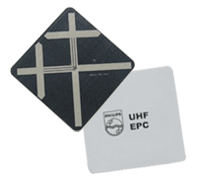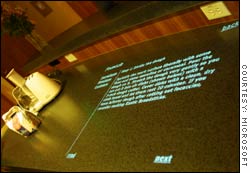NEW YORK (CNN/Money) -
Can a microchip the size of a pinhead revolutionize the retail industry?
 |
|
| RFID tags consist of a tiny chip the size of a pinhead containing an RFID code and a small antenna. |
Possibly. Or at least that's the perception among industry watchers when Wal-Mart, (WMT: Research, Estimates) the world's largest retailer, flexes its muscle and mandates that its top 100 vendors get cases of their products "RFID"-tagged by the beginning of next year.
A radio frequency identification chip -- RFID, for short -- is a tiny silicon chip that can hold up to 2KB of data on it.
Each chip is unique in that any item tagged with it can be tracked individually anywhere in the store or along the supply chain.
The chip can hold information about the product manufacturer, the retail price, production date as well as tell the store staff how long an item has been sitting on the shelf.
Although RFIDs has been around since the 1970s, the technology's been too expensive to be used commercially -- until now.
Wal-Mart's commitment to RFID tags indicates the technology is now ready for mass application, with the retail industry becoming the first to adopt it in a big way -- even though it raises some novel privacy concerns for the consumer.
| 
| |

| 
| 
|

|
 These days RFID technology is no longer just for managing inventory. As CNN's Maggie Lake reports, pet owners are relaying on it to identify their pets. (The adorable brown Labrador-mutt dog shown in this video is available for adoption, please call (212) 799-7000) These days RFID technology is no longer just for managing inventory. As CNN's Maggie Lake reports, pet owners are relaying on it to identify their pets. (The adorable brown Labrador-mutt dog shown in this video is available for adoption, please call (212) 799-7000)
|
 Play video
Play video
(Real or Windows Media)
|
| 
|

|
|
Wal-Mart, which plans to test the RFID in a few of its stores in Dallas, said the chips will help the company do a better job of having the right product in the right place at the right time.
Among Wal-Mart's suppliers fitting their products with the tags for the pilot test are consumer goods makers Gillette (G: Research, Estimates), Proctor & Gamble (PG: Research, Estimates) and foodmaker Kraft Foods (KFT: Research, Estimates).
Other retailers, including discounter Target (TGT: Research, Estimates) and electronics retailer Best Buy (BBY: Research, Estimates) are also eager to give the tags a try.
Christine Overby, senior analyst with Forrester Research, said the mainstream use of the tags will also help retailers control product theft and combat counterfeit products.
Big Brother in a shopping cart?
Amid all the hype about a little silicon chip is also a fair bit of controversy.
For now, the RFID tags will be used predominantly on cases on goods stocked in warehouses, and not on individual products.
However, privacy advocates say manufacturers could someday put the tags on single items that are bought by consumers and enter their homes. If that happens, it could allow retailers to track the movement of goods once they leave the store, enabling remote or even surreptitious tracking of products and people's buying habits.
"While we do see the benefits of RFID to managing inventory for retailers, we think the item-level tagging poses a serious issue for consumer privacy," said Katherine Albrecht, founder of CASPIAN, the leading consumer advocacy group opposing RFID tags.
"The industry is working on tags as small as the dot of on the letter 'i', or tags can be woven into fabric, in effect hiding them from the consumer," said Albrecht. "The best way to protect the consumer is to clearly label products that have the tags and let people decide whether or not they want to buy them."
Forrester's Overby disagreed with Albrecht.
 |
|
| The smart-RFID enabled kitchen counter recognizes products placed on it by reading their RFID tags. The counter will then suggest recipe choices using those ingredients. |
"There's a huge problem of misinformation out there about RFID chips and tags," she said. "Some people think that these tags are Big Brother incarnate. The purpose of these tags isn't to spy on consumers."
Judy Dobson, managing partner with NCR Corp. (NCR: Research, Estimates), one of the leading developers of RFID technology for retail application, said the tags do have limitations.
The chip is inert until it comes into contact with an RFID reader, Dobson said. The tag's antenna picks up the reader's signals and transmits encoded information about the product. Additionally, a person needs to get within inches of a product to actually read the tag using the reader.
Furthermore, EPCglobal, the agency responsible for establishing the standards for application of RFID tags and electronic product codes (EPC), has determined that the information of the RFID chips will not contain customer information.
"There's no possible reason for it," said Jack Grasso, spokesman for EPCglobal. "The codes on the RFID tags are similar to bar codes. It's just serialized data that identifies a product and the maker."
Microsoft plays tag with the home
Meanwhile, software maker Microsoft doesn't have qualms about taking RFID directly into consumers' homes in the future.
 |
|
| Microsoft's "smart" microwave can automatimally identify a product and pick the right temperature for preparing the food or beverage item. |
In its prototype "Home of the future" on its corporate campus in Redmond, Wash., are examples of everyday appliances such as a microwave, a fridge and even a basic kitchen counter smart enough to do a lot of the work for you.
The microwave, for example, is fitted with an EPC scanner. After you scan a can of soup that carries an RFID tag with the product description, it automatically figures out the ideal temperature to prepare the food.
Or consider the smart refrigerator fitted with RFID technology. Someday it will be able to automatically scan the contents and figure out what needs to be restocked or which items have hit their expiration date.
"The assumption we're making is that most objects in the future will have RFID chips or tags on them. So we're looking out 5 to 10 years at emerging technology to see how we can use RFID in the home to tailor it to families, their activities and to simplify their daily tasks," said Pam Heath, lead coordinator with Microsoft's consumer prototype and strategy team.

|

